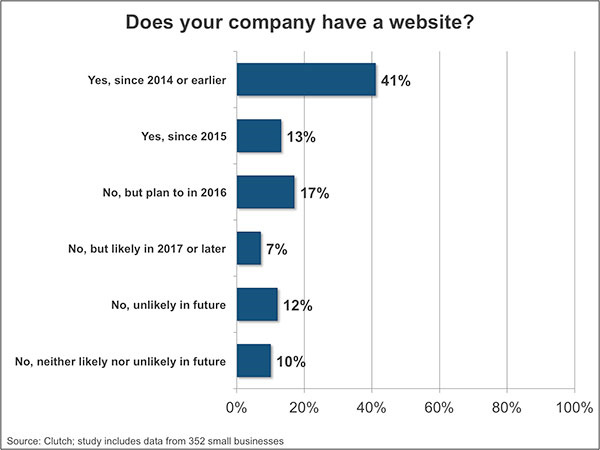Research demonstrates that smaller businesses, by and large, are not maximizing the benefit of their Internet presence.
29% of small businesses do not have a website, according to a study conducted in 2017 by Clutch (link). As Max Elman, the founder of Razorfrog Web Design, said in a statement released with the report:“No matter what type of business you run, if you have customers, it’s necessary to have some sort of information online, at least a page describing who you are and offering contact information. It’s essential to have this information indexed and shown to those looking for you.”

Image Credit: Clutch
New research by Approved Index, a B2B comparison site for business services has revealed the number of UK SMEs operating without a website and calculated the predicted uplift in revenue if they were to launch a new site, by industry sector and business size.
Key findings of the report include:
- 1.98 million SMEs do not have websites, costing them over £343 billion each year
- Introducing a website could equate to an average uplift in revenue of £173,769 per business
- Small-sized businesses stand to make the largest growth in revenue – £106 billion per year if they introduce a website
Some entrepreneurs feel discouraged after working on several business listings without getting the results they had in mind at the start. The problem is that not all business directories live up to Google’s standards, causing them to get ignored by the search engine.
Let’s analyze another economical circle: the online battleground. What is the role of web directories today and are they worth your time and money?
Getting a website listed on a directory used to be a sure path to web traffic and success. However, all this changed as search engines developed, and since 2012 when Google released the “Penguin” update, the value of directories dropped significantly, however, “directories can still play an important role in helping drive referral traffic to your site as well as bolstering your SEO campaign” according to an article published by Search Engine People, an industry specific publication.
Matt Cutts, the former head of the web spam team at Google, said in 2012 (video), that submitting to directories are recommended, if the directory accepts quality sites and is not simply a free-for-all link site: “Does the directory reject URLs? If every URL passes a review, the directory gets closer to just a list of links or a free-for-all link site.” – Matt Cutts
Some of the foremost known web directories are the Yahoo! Directory and the DMOZ. The Yahoo Directory has been shut down since 2014 and DMOZ was shut down a few years later, on the 14th of March 2017. The AOL-owned directory, DMOZ, was no longer supported by AOL.
Quality web directories hire trained reviewers whose job is to evaluate submitted links and put them in the right categories.
Matt Hodgson, owner of Addme, a SEO company founded in 1996, concluded that when done the right way, directories such as Jasmine Directory are far more reliable than a typical search engine result because they are edited by real people who go through every link to determine whether it provides any relevant information.
For example, Jasmine Directory lists educational resources and allows users to submit businesses for easy access by visitors. This web directory has been in existence since 2009 (created as a collaborative university project). It is renowned for its high editorial discretion and features several categories including arts, business, computers, finance, games, health, home, kids & teens, news, recreation, reference, science, shopping, society, sports and regional.
Each of the categories includes fields, for instance, the Computers category feature internet, software, hardware, programming and so forth and the fields in turn list matching websites.



 Bitcoin
Bitcoin  Ethereum
Ethereum  Tether
Tether  XRP
XRP  Solana
Solana  USDC
USDC  TRON
TRON  Cardano
Cardano  Lido Staked Ether
Lido Staked Ether  Avalanche
Avalanche  Toncoin
Toncoin